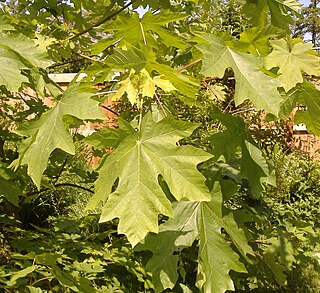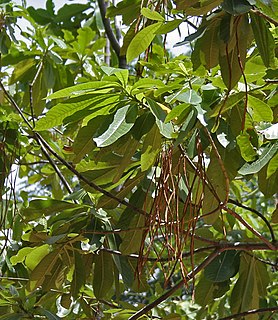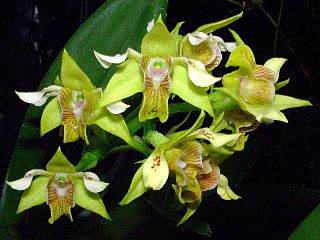
The flowering plant family Lauraceae, the laurels, includes the true laurel and its closest relatives. This family comprises about 2850 known species in about 45 genera worldwide. They are dicotyledons, and occur mainly in warm temperate and tropical regions, especially Southeast Asia and South America. Many are aromatic evergreen trees or shrubs, but some, such as Sassafras, are deciduous, or include both deciduous and evergreen trees and shrubs, especially in tropical and temperate climates. The genus Cassytha is unique in the Lauraceae in that its members are parasitic vines.

Acer macrophyllum, the bigleaf maple or Oregon maple, is a large deciduous tree in the genus Acer.
The Trinity bristle snail is a species of medium-sized land snail, a terrestrial pulmonate gastropod mollusc in the family Monadeniidae.

The long-legged bat is a member of the Phyllostomidae family in the order Chiroptera. Both males and females of this species are generally small, with wingspans reaching 80mm with an average weight ranging between 6 and 9 grams. The facial structure of these bats includes a shortened rostrum with a prominent noseleaf. The most defining feature of these bats however, is their long posterior limbs that extend farther than most Phyllostomidae bats. At the ends of these hind legs, the long-legged bat has abnormally large feet equipped with strong claws.

The common big-eared bat is a bat species from South and Central America. It is a neotropical leaf-nosed bat.

Rhododendron macrophyllum, the Pacific rhododendron, California rosebay, California rhododendron, coast rhododendron or big leaf rhododendron, is a large-leaved species of Rhododendron native to the Pacific Coast of North America. It is the state flower of Washington.
Calophyllum macrophyllum is a species of flowering plant in the Calophyllaceae family. It is found only in Maluku, Indonesia.

The gray short-tailed bat, or Hahn's short-tailed bat, is a species of bat in the family Phyllostomidae native to Mexico and Central America.

Alstonia macrophylla, the hard alstonia, hard milkwood or big-leaved macrophyllum, is a species of plant in the family Apocynaceae.
Beauprea congesta is a species of plant in the family Proteaceae. It is endemic to New Caledonia.
Geniostoma macrophyllum is a species of plant in the Loganiaceae family. It is endemic to Fiji.
Helicia albiflora is a species of plant in the family Proteaceae. It is endemic to Papua New Guinea. It is threatened by habitat loss.
Helicia amplifolia is a species of plant in the family Proteaceae. It is endemic to Papua New Guinea. It is threatened by habitat loss.
Helicia insularis is a species of plant in the family Proteaceae. It is endemic to Papua New Guinea. It is threatened by habitat loss.
Memecylon macrophyllum is a species of plant in the family Melastomataceae. It is endemic to Sri Lanka.
Urbanodendron bahiense is a species of plant in the Lauraceae. It is endemic to Rio de Janeiro, Brazil. The species epithet derives from the mistaken belief that the plant is from Bahia.
Urbanodendron is a genus of flowering plants in the family Lauraceae. The three species are native to Brazil.
Urbanodendron verrucosum is a species of plant in the family Lauraceae. It is endemic to Brazil.

Dendrobium macrophyllum, commonly known as the large-leaved dendrobium or pastor's orchid, is a species of Orchid.








